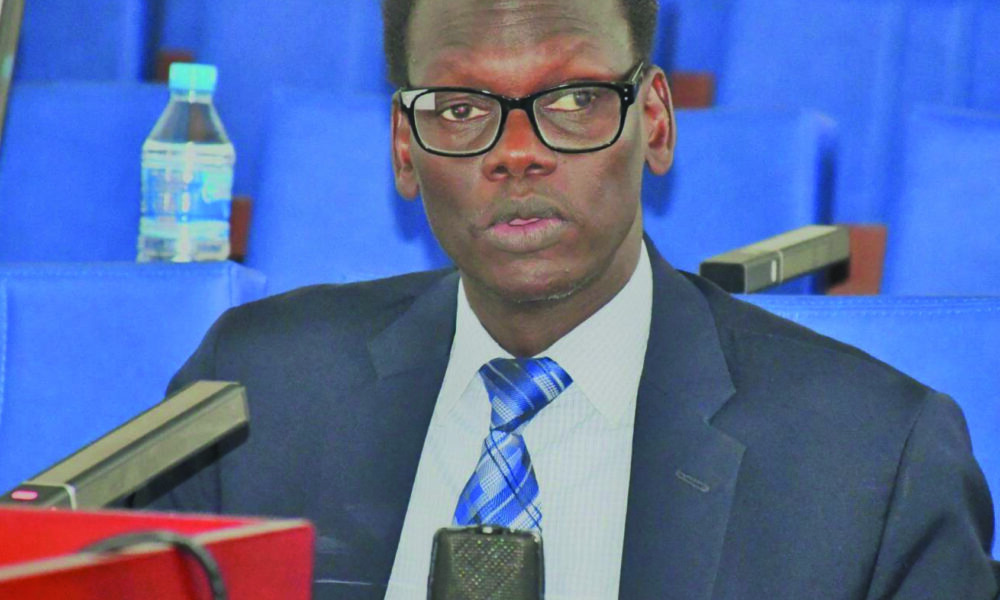By Bida Elly David
South Sudan faces worse risk of climate change catastrophe, if a quick intervention is not taken, an expert has warned.
Deng Majuk Chol, disclosed this during a presentation to the council of states about impact of climate change on South Sudan.
He said that preliminary research finding revealed that flooding is one of the major issues affecting majority population of South Sudan.
According to Deng, over 600,000 people have been displaced from their places of origin due to massive flooding.
“More than half of the population of South Sudan has been affected by flooding, either they have been displaced or migrated not only across their Counties and States but across trans- boundary,’’ he said
Deng said that Unity State is the most affected stated followed by Jonglei, Upper Nile and Warrap.
“One of the most affected is Unity State particularly Rubkona, Bentiu as a city, Mayom County, Gwit County and Mayendit County as well,’’ he said
The expert in his rating stressed that Unity State according to 2020-2021 suffered 90% battle of flood impact.
“In terms of the population disturbed by flooding, also Unity State is leading as well as the impact of flooding itself,’’ Deng stressed
Furthermore, he highlighted that Jonglei State takes the second lead with high passive flood impact mentioning Twic East, Fangak County saying population has been displaced with massive flood extent.
“I had an opportunity to engage with the population from Fangak who are currently in Malakal and also in Mangala as well as population from Duk County of Jonglei are also in Mangala,’’ he said
Although Warrap State is not badly affected, Deng stated that there are still some Counties that has been historically affected by flooding particularly Tonj North as well as Tuch County.
“All these Counties or States have swap population like Unity State being hosted in Abyei, in some places in Warrap including Kwajok and Tuch County is housing a number of internally displaced persons,’’ he added
He noted that some population is already in Uganda, Kenya, Democratic Republic of Congo and Sudan.
Moreover, Deng underscored that the impact of the flood has deprived people from farming creating serious food insecurity.
“We should also remember that most of the affected population in those areas has livestock that depend on grass land while grass land also depends on soil moisture,’’ he said
Deng echoed that while the area is submerged with water, the cattle die due to disease outbreak.
He echoed that his findings revealed weak adaptation of the Community to flood management.
“Their resilience level is so low because they were depending on dikes that are handmade, even some of the dikes in Bentiu that are made by tractors have potential impact,’’ Deng stressed
Nevertheless, he jagged that the 75 Kilometres Dikes in Bentiu saved a lot of population but still risky during heavy rainfall.
“Some of the affected communities never had access to migration because if they did have, they would have migrated, the result is, children, women and elderly men are affected uniquely,’’ he added
He called on government to ensure reconstruct the fulla dam saying it will help in generation of hydro-electric power also controlling flow of water mitigating flooding.
“The Fulla Dam is in a strategic location on the slope, with the capacity down there, it is conducive to generate tremendous mega wards power that can be used for our Country and can be used to reduce the flow of water or its speed that flows through Juba to Mangalla,’’ he added
For the case of Bentiu, Deng suggested need for full survey to be carried to render long term solution to the flooding.
“For Bentiu, there is need for a long-term survey from the Bahr-El-Ghazal region starting from where it originates in the boarder of DRC, Central Africa and Western Bahr-El-Ghazal and Western Equatoria coming all way to Warrap, Unity States,’’ he added
“I have proposed need for artificial lake between Upper Nile and Jonglei States in a collection point where all the water from the ground infiltration and from the rainfall eventually finds itself,’’ said
Meanwhile Deng Deng Akoon, the speaker of the Council of States applauded researcher Deng for his presentation saying the document will be tabled before the house and passed into a policy paper to help the government.
“We are very pleased with the presentation, it is a nice one for development purpose, we shall task the research document before the concerned committee for scrutiny so that it is used by the government for policy development,’’ Deng said




